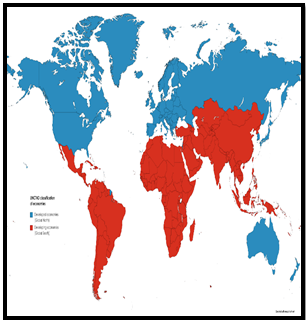DAVOS MAN AND GLOBAL SOUTH
(NAVIGATING SHIFTING GLOBAL DYNAMICS)
Syllabus: GS 2
- Bilateral, Regional and Global Groupings and Agreements involving India and/or affecting India’s interests.
- Effect of Policies and Politics of Developed and Developing Countries on India’s interests.
Why in the News?
- This week, three significant summits—Davos, NAM, and G77—illustrate the evolving landscape of global politics in 2024.
- The Davos elite grapples with the challenges to globalization, while the NAM and G77 address structural changes in the Global South.
Source: BNN
Understanding Davos Man
- Davos Man: A term referring to the globalist elite shaping the world since the 1990s.
- Origin: Coined after the World Economic Forum held in Davos, Switzerland.
- Characteristics: Representing economic and political elites focused on globalization.
- Since the 1990s, the globalist elite, often referred to as “Davos Man,” shaped a world characterized by free movement of capital, goods, and labour.
- Post-Cold War, global economic activity redistributed, emphasizing markets and efficiency, accompanied by the Washington Consensus.
- The long peace among major powers ended with renewed great power conflicts, upending the global order.
- Challenges include the war in Ukraine, rising tensions in East Asia, and conflicts in the Middle East, disrupting global economic flows.
Challenges, of the Davos Man’s World:
- Collapse of Globalized Order: The war in Ukraine, China’s rise, and regional tensions shattered the post-Cold War era of “Davos Man,” characterized by US dominance and economic liberalization.
- Nationalist Backlash: Growing anxieties about job losses, immigration, and climate change fueled populist movements against globalization and its neoliberal agenda.
- US Retreat: Trump’s “America First” policies and Biden’s focus on domestic needs further undermined the Davos consensus, shifting global power dynamics.
Understanding Global South
Historical Roots of the Global South
- Historical Context: The term “Global South” emphasizes post-colonial legacies and economic disparities.
- G-77 Formation: In 1964, G-77 emerged at UNCTAD, becoming the largest intergovernmental organization of developing countries.
- Purpose of G-77: Created to advance economic interests, it now includes 134 countries globally, referred to as “G-77+China.”
Revival of Global South: Factors and Criticisms
- Decline and Resurgence: Early 21st century witnessed a decline in interest, but recent global events revived attention on the Global South.
- Impact of Covid-19: Pandemic consequences refocused global attention on the vulnerabilities of Global South nations.
- Criticism of the Term: Criticized for inaccuracies, the term faces scrutiny for grouping diverse countries and ignoring economic realities.
- Need for Precision: The “Brandt Line” emerged in the 1980s for a more accurate economic division between the North and South.
Demands and Influence of the Global South
- Proportionate Voice: Demands for a proportionate and meaningful voice in global decision-making processes.
- Equitable Representation: Calls for equitable representation in global governance to reflect demographic and economic realities.
Global South’s Influence in Global Politics
- Prioritizing Global South: India’s G20 Presidency reflects a focus on Global South priorities.
- Global South Leadership: Developing nations hosting G20 demonstrate a desire for increased leadership in global decision-making.
- Inclusivity: Initiatives like the “Voice of the Global South” summit indicate a shift towards more inclusive global power structures.
- Multilateralism: Emphasis on Global South’s priorities in multilateral forums reflects commitment to collective decision-making.
- Rising Influence: Participation in G20, BRICS, Quad, and other global platforms showcases the increasing influence of the Global South.
Dilemma of the Global South:
- NAM and G77’s Limited Relevance: Despite renewed interest in the Global South, these traditional groupings face declining influence due to the rise of regionalism and BRICS.
- China’s Ambitions: Beijing actively courts developing nations through initiatives like BRI, aiming to reshape the world order and challenge US supremacy.
- India’s Reclaiming Act: India seeks to regain its leadership role within the Global South, balancing engagement with both China and the West.
Evidence of Increasing Global South Influence
- ‘Loss and Damage Fund’: Establishment at COP27 signifies acknowledgment of the disproportionate burden borne by the Global South.
- COP28 Expectations: Anticipation of Global South countries taking a leading role in COP28 discussions on climate change mitigation.
- G7 Inclusivity: Japan’s efforts to involve developing countries in G7 discussions demonstrate outreach to the Global South.
- BRICS Summit Expansion: Expansion from five to 11 members highlights engagement with and incorporation of more Global South countries.
- G-77 Summit in Cuba: Recent G-77 summit in Havana underscores the significance of the Global South on the global stage.
- African Union in G20: Inclusion of the African Union into the G20 recognizes African nations in global affairs.
Way Forward : Bridging the Gap
- Inclusive Dialogue: Encourage open discussions between Davos Man and the Global South to address common challenges.
- Global Institution Reform: Collaborate on reforming global institutions for fair representation.
- Economic Disparity: Develop strategies to tackle economic inequalities highlighted by the Global South.
- SDG Alignment: Work together on achieving Sustainable Development Goals (SDGs) for global betterment.
- Multilateral Approaches: Emphasize collective action for global challenges, acknowledging interdependence.
- Tech Transfer and Capacity Building: Facilitate technology transfer and capacity building for sustainable development.
- Fair Trade Advocacy: Support fair trade practices for mutually beneficial economic relationships.
- Crisis Response Cooperation: Establish mechanisms for joint crisis response to address global challenges.
The history, demands, and influence of the Global South reveal a complex interplay of historical legacies, current challenges, and evolving dynamics in global politics. The region’s increasing influence signifies a shift in the global order, with the Global South playing a central role in shaping the emerging world paradigm.
Source:
Mains Practice Question:
Critically examine the evolving relationship between the “Davos Man” and the “Global South” in the context of the 2024 summit in Davos, Switzerland.

 Source: BNN
Source: BNN

